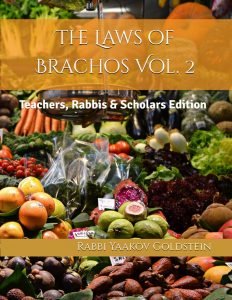*As an Amazon Associate I earn from qualifying purchases.
- Fruit that is not fully ripe or edible – Which Bracha is recited; Haeitz, Ha’adama, Shehakol, or no blessing:[1]
The general rule:
Edible: Even if the fruit is still s
mall, so long as it is not too bitter or sour to be eaten, its blessing remains Haeitz. This applies even if they are only edible in a time of need. [This however only applies if the fruit could have potentially become ripe if left on the tree. If however the fruit cannot ripen due to some defect or illness of the fruit, or due to the lack of season, then their blessing is Shehakol.[2]]
Not edible: If the fruit or vegetable is too bitter or sour to be eaten even in a time of need, then no blessing is to be said over it.
Edible through cooking: In such a case that the fruit or vegetable is too bitter or sour to be eaten, then if one cooked the fruit and it became edible then its Bracha is Shehakol.
- Examples:[3]
Small unripe grapes:[4] Grapes which are not ripe but are already edible, receive the blessing of Ha’adama. Nonetheless, Bedieved if one said Haeitz he is Yotzei. Upon them becoming fully ripe they become Haeitz.
Almonds:[5] Raw almonds which are bitter and inedible, do not receive a blessing if one chooses to eat them. Roasted almonds however are Haeitz.
| Case | Edibility | Blessing | Notes |
| Fruit still small | Edible (not too bitter/sour) | Haeitz | Even if only edible in a time of need; applies if could become ripe |
| Fruit cannot ripen | Edible | Shehakol | Due to defect, illness, or lack of season |
| Fruit/vegetable too bitter/sour | Not edible even in time of need | No blessing | |
| Fruit/vegetable cooked to become edible | Edible after cooking | Shehakol | |
| Small unripe grapes | Already edible | Ha’adama | If said Haeitz, Yotzei; when fully ripe, Haeitz |
| Raw almonds (bitter, inedible) | Inedible | No blessing | |
| Roasted almonds | Edible | Haeitz |
______________________________
[1] Seder 6:1; Luach 9:1; 202:4; Michaber 202:2; Rashba Brachos 36b; Rosh Brachos 6:5; Ketzos Hashulchan 49:7
[2] Admur 202:6
[3] See Seder 6:1; Ketzos Hashulchan 49:7
[4] Admur 203:3; Tzemach Tzedek 26; Ketzos Hashulchan 49 footnote 11
[5] Seder 6:2; Luach 9:2; Admur 202:5; Michaber 202:5


 Donate
Donate
Leave A Comment?
You must be logged in to post a comment.